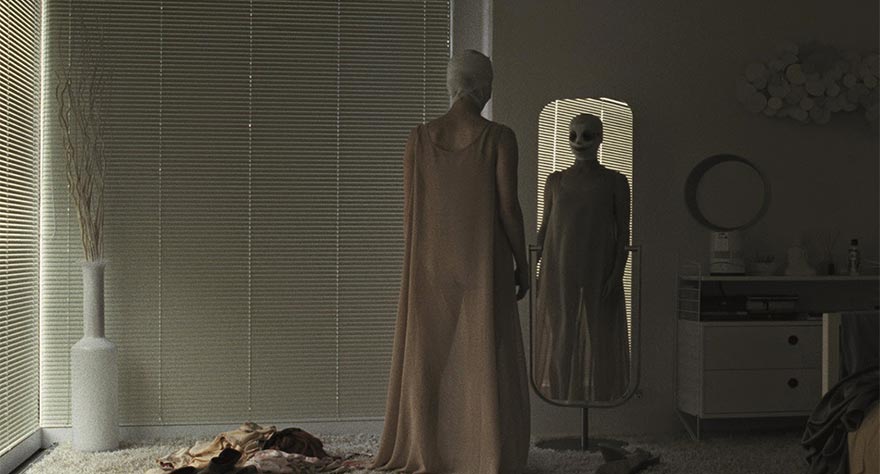
Twin boys suspect their bandaged mother isn't who she says in this nerve-shredding horror.

Twin boys suspect their bandaged mother isn't who she says in this nerve-shredding horror.
It can’t be entirely coincidental that last year’s breakout horror film, The Babadook, was centered around the frustrating and intimate relationship of a mother and her child and this year’s best horror film—it’s true, I’m putting it in writing—is very similarly themed. In Goodnight Mommy, from Austrian directors Severin Fiala and Veronika Franz who also wrote the script, instead of a mother wary of her high-strung child, two twin brothers become suspicious of their mother when she returns from plastic surgery with her face in bandages. What The Babadook did so brilliantly was to fluctuate between two horror-mother norms: the mother as savior (think Poltergeist’s Diane Freeling) and the mother as an evil threat (think Carrie’s Margaret White). Goodnight Mommy similarly plays with these horror expectations of mothers but keeps its audience guessing by placing the vantage point in the immature, and therefore unreliable, eyes of two nine-year-old twin boys.
With no sense of what the children’s mother (Susanne Wuest) was like before she arrives back home in full facial bandages, the film is immediately set up for our trust to lie wholly with Elias and Lukas (Elias Schwarz and Lukas Schwarz), a pair of boys who love to roam the woods and fields around their country home, collecting bugs and caring for animals. When their mother returns after surgery—and through an awkward guessing game she plays with the boys it’s revealed she’s a famous TV personality, so it’s likely cosmetic—the boys take the brunt of her sudden mood swings and apparent preferential treatment of one twin over the other. She is volatile and unreasonably strict. When her behavior gets stranger and her temper more intense, the boys—their insatiable curiosity evident—test their mother and track her behavior in an attempt to prove their theory.
The film picks up—and indeed shifts darkly—in its second half when the boys plan, first, to escape the intruder they believe is posing as their mother, and then when that fails, to take action into their own hands to get answers. I’m not going to sugarcoat it, things get squirmy. Even more squirmy because of the constant question of whether or not the violence is or is not deserved. There’s an excellent eleventh-hour reveal that this viewer certainly did not predict and certainly won’t elaborate on. Suffice it to say the film excellently holds focus to divert from the reality of the situation.
The Schwarz brothers carry the film incredibly well for their age and the relatively small amount of dialogue involved. Their constant discomfort at trying first to please their mother and understand her actions, and then at the dawning terror of believing she isn’t who they think, is perfectly conveyed in their nine-year-old fidgeting and wide eyes. They constantly convey that childlike hesitancy in questioning elders or believing a family member could ever be capable of anything but loving behavior. And when things get serious it’s that innocent quality that amplifies the horror of their behavior. It’s so easy for children to be evil in horror films, something we’ve come to expect even, and Fiala and Franz don’t let the boys fall squarely into that space. Their intentions—to get their mother back—are so pure it’s hard not to justify the actions of a pair of scared (and perhaps too imaginative) little boys.
The boys’ imaginations are used throughout the film, often practically as they invent new ways of testing and keeping an eye on their maybe-faux-mother, but also literally in scenes that are revealed to actually be dreams. Normally the use of false-reality sequences in horror films feel like cheap scares, showing supernatural elements in order to trick us into thinking we understand what’s happening, only to be yanked back into the present and be just as confused as ever. But Fiala and Franz use these moments sparingly and add plausibility by making it so easy to believe children have vivid and scary dreams. The effective and limited use of music also gives a sense of realism that enhances the tension and blurs the line between what is real and what isn’t. Cinematographer Martin Gschlacht, shooting on 35-milimeter, frames the stoic modern house with its wide windows against the many outdoor scenes of the boys playing in yellow fields, jumping on drying mud, and winding through corn fields and tree-filled forests. The distinction clearly implying the serene safety of the outside versus the cold grey uncertainty of their mother’s home.
At all moments a deftly crafted mystery and with thoughtful scares and the sort of shocks that don’t feel extraneous, Goodnight Mommy is a must-see for anyone who appreciates sustained suspense, and who maybe doesn’t mind a trip to a masseuse after to get all that tension worked out. A repeat viewing feels necessary to watch the film with fresh eyes after the truth is revealed, and if mandatory repeat watching isn’t the mark of a good film, I don’t know what is.
Goodnight Mommy is currently playing in NY, LA, and Austin and will open in additional cities September 25, 2015.